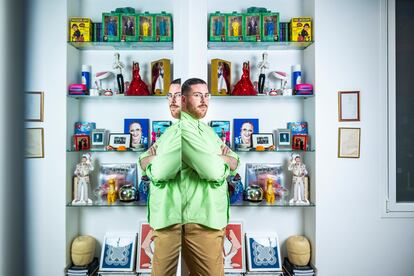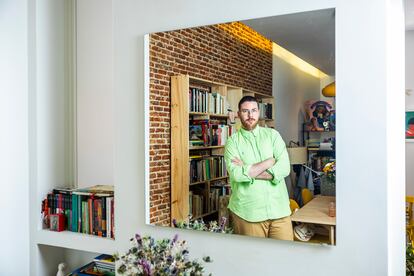Two circumstances have marked the life of Enrique Aparicio (Alpera, Albacete, 35 years old) so far. First a wish: he wanted, one day, to write a novel. And second, a reality: he was a “faggot, fat and from the town” kid, as he defines himself on his networks; three death traps for self-esteem that requires putting together and sending manuscripts. Better not even talk about class privileges.
What mediates between those circumstances and the publication, now, of The stain (Plaza and Janés), is a very 21st century story: Aparicio made a name for himself with projects that he himself started on the internet under the name @esnorquel. In 2019 he started the most successful of them, the podcast confessional I can talk!: Together with Beatriz Cepeda (@perradesatan) and a series of guests, Aparicio was publicly breaking down his complexes as a faggot, as a fat man, as a townsperson (Alpera has 2,326 inhabitants). Like everything he believed he should hide. 200 episodes were released, some recorded before thousands of viewers throughout Spain; a book; a theatrical work; his subsequent tour. Pedro Sánchez acclaimed it in October 2021. In June, the duo will record their last chapter.
Meanwhile, Aparicio (without symbols or pseudonyms) fulfills that dream of publishing the novel, about a young gay man, Valentín, who, due to the 2013 recession, must abandon his success in Madrid and return to his hometown. This time, the author does not take these circumstances as death traps. When viewed properly, they can simply be the starting point of a larger story.
Ask. What is the stain, in round letters?
Answer. If I had been 15 years older, my homosexuality might have landed me in jail. At 15 years younger, I wouldn’t have even come out of the closet: young people don’t do that anymore. But I was a child in the nineties and a teenager in the 2000s, I came out of the closet and by the way I did it as I learned that I had to come out, with the Pablo Alborán squad: contrite face, great crying, as if confessing a crime. It is now up to those of us in my generation to reevaluate those years, to say: ‘What has happened to us?’ If it is no longer a crime to be homosexual, if I am tolerated, Why do I still consider myself worse than others? Why are there more queers with these problems and this conception of themselves than heterosexuals? Why is our generation devastated in terms of mental health, with addiction problems?
P. What is your diagnosis?
R. Having grown up in a homophobic, transphobic, biphobic world. As much as beatings continue to occur now (and even those who do not suffer them explicitly, suffer implicit violence), those of my generation have become adults feeling alone. We didn’t fit in and we had a stain inside that we tried to hide. As adults, we have gone from hiding it to claiming it, sometimes without the tools that that leap requires. From the closet in your town to the Pride float in Madrid, and then back to the closet on Sunday afternoon. That clash is what my book represents.
P. And what is The stain, in italics, for you?
R. The culmination of my relationship with that childhood and adolescence. I have finally freed myself from what is happening to the protagonist in that summer of 2013. And I think, damn, it’s a good thing I didn’t publish the novel before because it would have been a hand grenade against my town and against my adolescence and against my childhood, to return their pain.
P. The book warns of the danger of settling into one’s own pain.
R. Like the protagonist, I had wounds that at first I did not understand and that later, I did not know how to manage. Now I give them the space they require, which is not absolute. I have learned to look up and see the rest of the world. My traumatic adolescence no longer defines me, it’s that simple. I am even doing the exercise of consciously recovering my La Mancha accent, which for many years I tried to eradicate.
P. In the book, the protagonist is stuck between who he feels he is on the inside and how his environment defines him. His way of solving it is to take refuge in the internet. In his case, almost his entire public career has been developed through personalities online. Before Enrique Aparicio you have been @esnorquel in your podcast and, more briefly, EsnorquelDJ in a musical group, Monterrosa, which drank from cybernetic aesthetics. Did she also take refuge on the internet?
R. They have to call you from the analog world. I have a podcast because no one offered me to do radio. I have uploaded my songs to Spotify, my podcasts to iVoox, my articles to Medium… It is the possibility that opened up one day when a man from Telefónica came—not even Movistar, I’m telling you; from Telefónica—home to put in a modem. In that teenage room, in which I had locked myself to protect myself from the gaze of my family, of my countrymen, there I could show myself in other ways in the eyes of strangers on the Internet. I didn’t feel safe in the one-on-one going to the butcher shop in my town, but I did feel safe writing in a Fotolog.
P. Is it a coincidence that you now resolve this conflict by leaving the refuge of digital, with a product as analogous as a book?
R. Makes sense. I was not only surfing, sometimes shipwrecking, on the Internet; I was also reading, nourishing myself with other things. That combination is, I think, very generational.
P. His greatest success so far has been I can talk!. How do you see it now?
R. We made a difference by addressing mental health problems from the point of view of the user, not the professional. It was not a psychiatrist who explains how to detect depression, it was “this is how I detected my depression”, “this is how I experience anxiety”. Many people had not heard anyone say, hey, going to the psychologist is this…. We know that, thanks to listening to us, many have asked for help. The moment he arrived was very important because there was no hashtag #mental health as it exists now. There were not 700 results, if you know how to look for them, specialized in everything.
P. Despite the success, he never had a sponsor.
R. I can talk! It has had a long journey but not enough to become my profession. It depends exclusively on this house, on my computer, on me being there editing and uploading programs. Maybe if Bea and I, instead of starting in 2019, had done it the day it started The posh and the quinqui Well, maybe… maybe by the time the money arrived to the podcasts We were already old chickens. Or if we were cuter or if we were thin…
P. Can we consider him an internet personality?
R. The internet has not given me a job, I have generated it for myself.

P. Are you good at the digital world?
R. There are those who are very skilled at being on the Internet, they share everything and it works out on their own. I’m not that person. For me, posting a tweet means thinking for a long time, in that sense I am very analogical. I want to think that what I offer on the internet is already something worked on, not something haphazard. I handle myself very well with the production of ideas that are not immediate, perhaps that is why I have the followers I have (12,200 on Instagram, 10,000 on X) and no more. There are people who do this very well: “This morning something happens at three in the afternoon and you have a reel of three minutes giving you my opinion.” I complain that the internet is a little slow. Something that is probably going to leave me out of my game in many things. I like it that way.
P. What is the main lesson you draw from these five years?
R. (Thinks for a few seconds) I did well by inventing things. I did well by leaving modesty aside to offer the world things that have been useful and healing for many people. It was okay to be me, I didn’t know that then. I was terrified of not being enough, of not being worth it. Now I know I’m worth it. Sometimes you think that if others notice you long enough they will realize what a worm you are. For me, these years, this novel, mean looking up from my wounds and allowing the world to look at me.
Subscribe to continue reading
Read without limits
_

